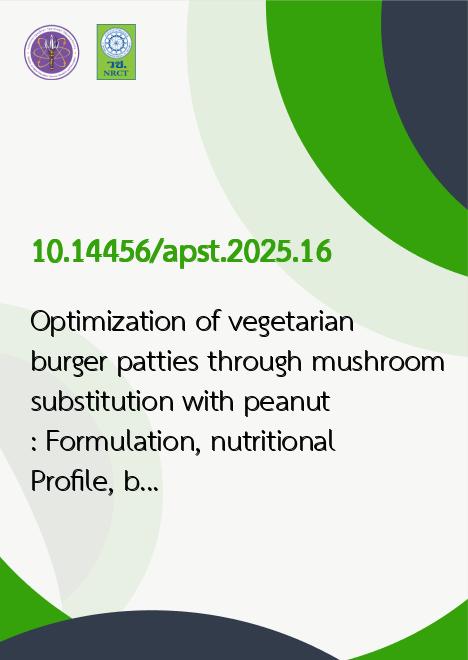
|
Optimization of vegetarian burger patties through mushroom substitution with peanut: Formulation, nutritional Profile, bioactivity, and consumer acceptability evaluation |
|---|---|
| รหัสดีโอไอ | |
| Creator | Ryan H.Setyawan |
| Title | Optimization of vegetarian burger patties through mushroom substitution with peanut: Formulation, nutritional Profile, bioactivity, and consumer acceptability evaluation |
| Contributor | Rizki R. Elfirta, Iwan Saskiawan, Nunuk Widhyastuti, Kasirah, Rina K. Dewi |
| Publisher | Khon Kaen University, Thailand |
| Publication Year | 2568 |
| Journal Title | Asia-Pacific Journal of Science and Technology |
| Journal Vol. | 30 |
| Journal No. | 2 |
| Page no. | 1 (8 pages) |
| Keyword | Oyster mushroom, Peanut, Non-meat product, Optimization formula |
| URL Website | https://apst.kku.ac.th/ |
| Website title | https://apst.kku.ac.th/optimization-of-vegetarian-burger-patties-through-mushroom-substitution-with-peanut-formulation-nutritional-profile-bioactivity-and-consumer-acceptability-evaluation/ |
| ISSN | 2539-6293 |
| Abstract | The consumption of meat has been linked to an increasing prevalence of various diseases and negative environmental impacts, highlighting the necessity for alternative protein sources. Oyster mushrooms (Pleurotus ostreatus) and peanuts (Arachis hypogaea) offer promising alternatives for use in vegetarian burger patties. Achieving the optimal ratio between oyster mushrooms and peanuts is crucial to produce a vegetarian burger that meets the desired standards of consumer acceptability, nutritional value, and bioactivity. Four different formulations of vegetarian burgers were developed, each varying in the level of mushroom-peanut substitution (0%, 5%, 10%, and 15%). Each formula was evaluated based on its nutritional value (moisture, ash, protein, fat, carbohydrate, and dietary fiber), bioactive compounds (antioxidant activity, total phenolic compounds, and ?-glucan), and sensory attributes (color, aroma, flavor, texture, and overall acceptability). The selected formula was characterized for its amino acid profile. The results revealed that substituting mushrooms with peanuts led to an increase in protein content, lipid content, and total phenolic compounds, significantly impacting consumer acceptance in all vegetarian burger patty attributes. On the contrary, the addition of peanuts resulted in a reduction in moisture content, ash content, dietary fiber content, antioxidant activity, and ?-glucan content. Meanwhile, it did not significantly impact consumer acceptance in all vegetarian burger patty attributes. After a thorough assessment, the formulation featuring a 10% peanut substitution was identified as the most optimal, striking a balance between sensory evaluation, nutritional value, and bioactivity of the vegetarian burger patty. Afterward, the selected formula was characterized for its free amino acids profile. |